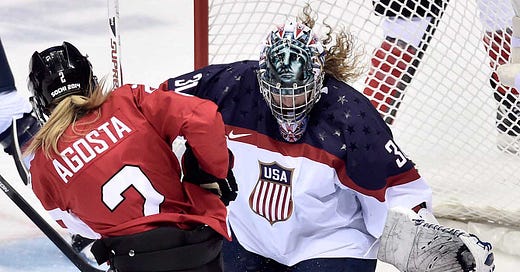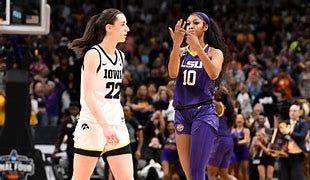The Caitlin Clark Effect
"You Either Die A Hero, Or You Live Long Enough To See Yourself Become The Villain"
I have a theory.
Last night, I watched the NCAA Women’s College March Madness basketball game between Iowa and LSU. It featured a rematch of last year’s championship game.
It also featured a rematch between Iowa star Caitlin Clark and LSU’s Angel Reese.
You would need to be living under a rock not to know about the rivalry between the two.
Last night, Caitlin Clark lifted the Iowa Hawkeyes on her back and carried them to the Final Four. But she is a champion already.
I have a theory that the heat between Clark and Reese was more of a show than true animus.
A good quote from Sports Illustrated: "Me and Caitlin Clark don't hate each other," Reese said. "I want everybody to understand that. It's just a super competitive game. Once I get between those lines, there's no friends. I have plenty of friends on the court that I talk to outside of the game, but like when I get between those lines, we're not friends. We're not buddies. I'm going to talk trash to you. I'm going to do whatever it takes to get in your head the whole entire game, but after the game we can kick it."
Despite a heat that might put pro wrestling to shame, both women are competitors on the court but it’s not personal, it’s just about getting the job done.
Clark and Reese knew what they had: lightning in a bottle. They both knew the eyes of North America and beyond were on them and that a great hero/villain story could be the spark women’s sports needed to finally cement themselves in the North American sports scene.
Women’s sports has been growing in leaps and bounds in the past two decades. Whether it is the WNBA, PWHL, WPGA, WTA or women’s soccer (Christine Sinclair!), women’s sports has never been more popular and it is gaining fans and participants every single day.
I’ve always been a fan. One of my idols growing up was Menon Rheaume, the first woman to play in an exhibition game for any of the four North American pro sports leagues. Hayley Wickenheiser, now an ER doctor in Calgary, played men’s pro hockey in Finland after starring for years on the Canadian women’s national team.
Last weekend my son and I watched a family friend playing in her championship game in Belle River. Owen has always had girls on his sports teams, whether it has been hockey, lacrosse, track or badminton. One of the best hockey camps he ever attended was put on my local hockey hero legend Meghan Agosta.
This game between Iowa and LSU wouldn’t make women’s sports popular. They already are.
But the rivalry between Clark and Reese would capture the imagination in a rear naked chokehold like never before.
So what does all this have to do with healthcare in Canada?
The right story can create a paradigm shift. The right narrative can move the needle.
Just like the Iowa/LSU game could be the quantum leap forward for women’s sports in North America, could the right patient story could do the same for healthcare in Canada? Could the right political debate or narrative finally break Canada from its perennial “wash, rinse and repeat?”
I have previously written about the power of patient stories and narrative medicine.
Healthcare in Canada continues to struggle. The Canada Health Act turns 40 this year and, frankly, it is looks and feels a lot older than that. Every day across Canada there are stories in the newspapers about our struggling system and the gaps there within.
The Canada Health Act was hailed as a hero when it was introduced on April 17, 1984. But it has never lived up to the hype.
“Die a hero, or live long enough to see yourself become the villain.”
Maybe its time for Canadians to take a second look at our beloved Canada Health Act using a critical eye and decide if it has lived up to the ideals and aspirations it was supposed to.
It’s nothing personal.
Is the Canada Health Act the hero or villain in this story?
Back to Clark and Reese. Reese fouled out of the game and Clark finished with a double-double (eh?). Despite all the history and animosity (real or contrived), Clark and Reese embraced after the game in the handshake line. They set aside emotion and congratulated one another on a game well played. Both will go on to fame and fortune at the WNBA and beyond.
It’s time Canada found its own Clark and Reese for healthcare.
Addendum:









